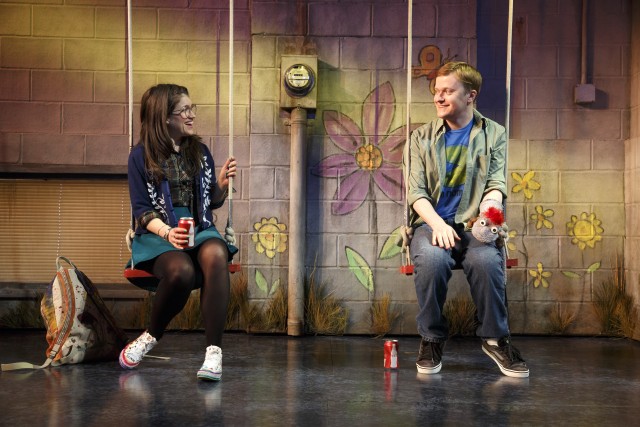
Pastor Greg (Marc Kudisch) looks on as his church’s Christcateers rehearse in HAND TO GOD (photo by Joan Marcus)
Booth Theatre
222 West 45th St. between Broadway & Eighth Ave.
Tuesday – Sunday through October 4, $59 – $137
handtogodbroadway.com
www.shubert.nyc
Robert Askins’s Hand to God is one of the most outrageously hysterical and devilishly strange shows to come to Broadway in a long time. Originally presented by Ensemble Studio Theatre in 2011 and then by MCC Theater at the Lucille Lortel in early 2014, Hand to God features a sensational central performance by Steven Boyer, who has been with the play since the beginning; it’s the kind of all-in exhibition you cannot imagine any other actor being able to even approach, so infused with a near-frightening level of skill and intelligence — and an obsessive quality that translates well to his character. Boyer (Modern Terrorism, Trevor) stars as Jason, a severely repressed teen dealing rather poorly with the recent death of his father. Jason is part of a small church group in Texas preparing to put on a moralistic puppet show for the congregation. The troupe is led by Jason’s mother, Margery (Geneva Carr), and also includes two other kids, the shy, practical, geek-chic Jessica (Sarah Stiles) and the tough-talking rebel Timothy (Michael Oberholtzer). They get together in the church basement, where they are occasionally visited by Pastor Greg (Marc Kudisch), who has his own ideas about how to help the widowed Margery through her newfound loneliness. Oh, and there’s one more character: Tyrone, Jason’s sock puppet and alter ego, who doesn’t take kindly to Jason’s attempt to destroy him, leading to no-holds-barred shenanigans that combine the sexiness of Avenue Q and the chills of The Exorcist with the lovable grossness of Ben Stiller’s Skank and the raunch of Seth MacFarlane’s Ted.

Tyrone comes between Jessica (Sarah Stiles) and Jason (Steven Boyer) in Tony-nominated demonic comedy (photo by Joan Marcus)
In Hand to God, Askins, whose latest work, Permission, is currently at MCC Theater, explores the conflux of the id, the ego, and the super-ego, examining where people turn to in times of trouble. While some may see it as blasphemous, it is not so much about religion as it is about personal demons and inner oppression. It’s also damn funny. “You’re so far back in the closet, you’re in Narnia,” Jessica tells Timothy early on. All five of the characters are flawed, but it’s Jason who responds to reality in the most dangerous way. “I think it’s doing bad things to me,” he says about Tyrone in the first act, but in the second act he says, “I don’t want to be bad,” perhaps recognizing that Tyrone is part of himself. Then again, judging by the awesomely satanic set change by Beowulf Boritt (Act One, The Scottsboro Boys) following intermission, and the rapturous skill with which Boyer deviates between Jason and Tyrone, whether re-creating Abbott and Costello’s “Who’s on First?” routine or leering at Jessica’s sock puppet, Jolene, maybe Tyrone is a possessed being all its own after all. The diabolical doings are handled with a thrilling chaos by director Moritz von Stuelpnagel (Verité, Trevor) and the excellent cast; you might not know what’s going to happen next, but you can be sure it will be extremely bizarre, potentially violent, and an absolute riot.